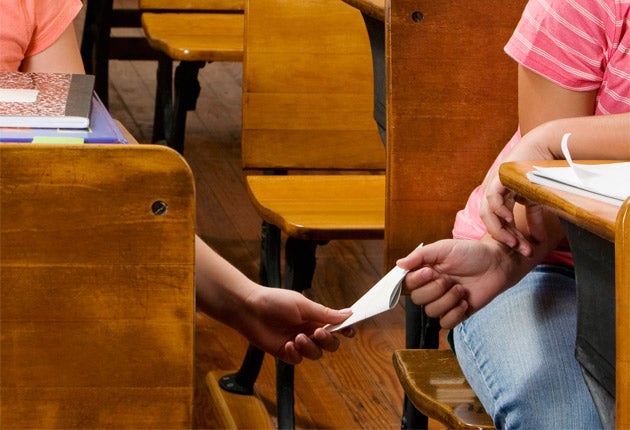More cheating – and that's just the teachers
Number of staff members disciplined for 'malpractice' in exams up 30 per cent

Cheating in GCSE and A-levels by pupils, teachers and even school exam centres rose markedly last year, with ever more sophisticated electronic gadgets being smuggled into exam halls.
The number of teenagers found guilty of cheating rose by 6.2 per cent to 4,415 during last summer's exams. But not only pupils were at it – the number of teachers disciplined for test "malpractice" was 30 per cent higher than the year before.
A breakdown of figures from the Office of the Qualifications and Exams Regulator (Ofqual) showed that the most common form of cheating was "bringing a mobile phone or other electronic gadget" into the room.
Some candidates were caught with concealed earpieces, described as "exam cheat equipment" on some of the websites that sell them, which could receive information from outside an exam hall. Exam bosses admitted that these were more difficult to detect, although many schools now use mobile tracking devices to detect whether a signal is being sent from anywhere in the room. The second most common cause of malpractice was plagiarism or copying other students' work, which accounted for 1,084 cases. Disruptive behaviour in the exam room, including swearing, rose from 514 cases in 2008 to 539 last year.
Candidates were also docked marks for including offensive and obscene comments in their exam papers.
In total, 2,155 students lost marks after being found guilty, 644 failed their exams and 1,616 escaped with warnings. "Candidates who bring a mobile phone into an exams room but do not have the phone at their desk might receive a warning, whereas candidates found using a mobile phone during an exam might be disqualified from the unit or qualification in the current exam series," a spokesman for Ofqual explained.
The number of teachers disciplined rose from 68 to 88, and 17 were suspended from invigilating in exams. Their crimes including leaving the exam hall unsupervised and helping candidates to answer questions.
Ofqual stressed that the figures confirmed that only 0.03 per cent of pupils cheated in exams taken last summer.
However, Jim Sinclair, director of the Joint Council for Qualifications, the organisation which represents the examination boards, said it took a "zero tolerance" approach to all forms of cheating, including the possession of unauthorised items such as mobile phones, iPods and other digital music players.
Mick Brookes, of the National Association of Head Teachers, said he did not condone cheating but pointed out that children knew some exams were "extremely high stakes" and schools were under more pressure to succeed. He added: "Young people are in a highly pressurised environment, partly due to the jobs market being more difficult than it was, and university entrance being restricted."
Unfair advantages
* The most common form of cheating is bringing an unauthorised device into the examination room. These are no longer just mobile phones but also more general data devices such as MP3 players which hold text, images, audio and video. Some pupils have been caught wearing concealed earpieces on which they can receive information in the exam room.
* Schools and exam boards are fighting back. A Gloucestershire company, Mobysafe, sells schools hand-held mobile phone detectors which can be placed in the examination room to detect any electronic signals.
* A more traditional form of cheating is the second most common type: plagiarism. That is, writing answers down from the internet on coursework without amending them. This is often detected during marking by an examiner with a detailed knowledge of website sources available to answer the question. Denmark has got round this by throwing in the towel and allowing its pupils to have access to the internet during exams.
* Thirdly, copying and collusion still take place in the exam hall when the invigilator's back is turned.
* One form of cheating which has disappeared as a result of new technology is writing answers on your arm under your sleeve.
Subscribe to Independent Premium to bookmark this article
Want to bookmark your favourite articles and stories to read or reference later? Start your Independent Premium subscription today.

Join our commenting forum
Join thought-provoking conversations, follow other Independent readers and see their replies